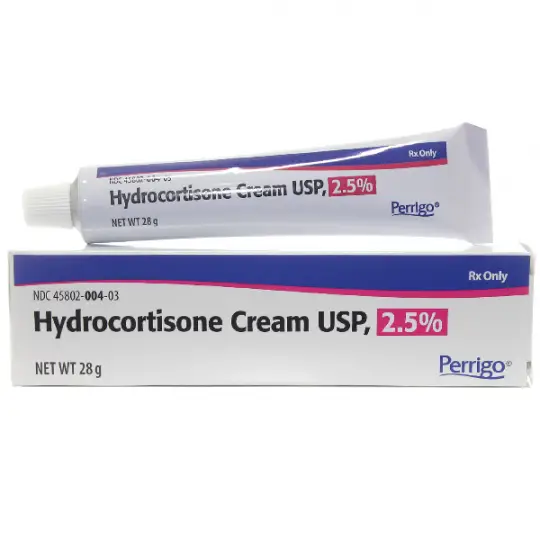Hydrocortisone is a common facial steroid cream used to treat Eczema, but should you use it? Before you read this article, I highly suggest you read our article on steroid creams and how harmful they can be.
What is Hydrocortisone?
Hydrocortisone creams area a type of medicine known as a ‘steroid’. They are used on the skin to treat various conditions like swelling, itching and irritation. It is a common steroid cream for Eczema and are considered to be quite mild. The majority of hydrocortisone creams are mild at 1% strength, but can go up to 2.5% (25mg hydrocortisone in each gram of cream).
Pharmacy’s can only hydrocortisone creams up a maximum strength of 1%. To get a stronger cream, you must contact your doctor and get a prescription.
Hydrocortisone is not recommended for children under 10 years. It can be prescribed by a doctor. All instructions from a doctor should be followed when applying hydrocortisone as it can be damaging. The recommended time period to use the cream is no longer than a week. The cream cannot be used by anyone trying to get pregnant, are pregnant or breastfeeding.
How should I use hydrocortisone?
The amount of cream that should be used is measured by fingertip units. One fingertip should be enough for an area that is the size of your hand. You should definitely not go over the recommended amount.
Hydrocortisone is better for skin which is moist and weepy, with clear or yellow fluid. As it is a thicker and greasier ointment, it is better for dry or flaky areas of skin.
It is recommended to not use hydrocortisone with other creams at the same time. A good time period is at least 10 minutes between products. In an ideal situation, you should use the different products at different times of the day.
What is in Hydrocortisone creams?
The main ingredient in Hydrocortisone cream is, hydrocortisone! A generally safe ingredient, but it should be noted that it is suspected of damaging fertility and can cause damage to organs through prolonged/repeated exposure. It has many potential health concerns and benefits, which emphasises the importance of following the instructions of the product.
Hydrocortisone creams can have other ingredients. Consumers should always check the ingredients label, as they can contain harmful ingredients.

Walgreen’s Hydrocortisone Cream 1% Maximum Strength Aloe has two harmful ingredients that come with the steroid cream. It has Benzyl Alcohol and Methylparaben, both which can cause skin irritation. To view all the ingredients in the product, you use 1Source.com to decode the product and analyse the ingredients for you! Click here.
Should I Use Hydrocortisone?
Unless you have severe Eczema, you should avoid steroid creams, especially on the face. There has been links with excessive use of steroid creams can cause thinning of the skin, making it more prone to outbreaks.
I went off hydrocortisone creams and saw great improvements when adopting a simple skincare routine for my face. It should be noted that in the short term, steroid creams can have an effect. In the long term, there is more damage. To read my story, click here.
What is TSW?
Red Skin Syndrome, or Tropical Steroid Withdrawal (TSW) are a result of long term users of tropical steroids stopping their usage. TSW can include the following symptoms:
- Red skin
- Burning sensation
- Itchiness
Tropical steroids have been used for over 50 years in treating eczema and atopic dermatitis. To this day, it still remains one of the most effective drugs in dermatology as it works directly with the natural system in the body.
It must be noted that the condition does not occur with normal use. It generally requires the application of a tropical steroid like hydrocortisone at least daily for more than a year.
For more information on TSW visit here.

